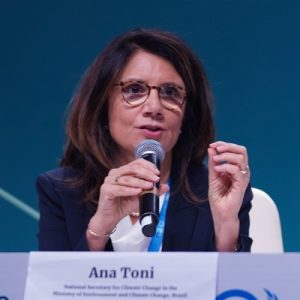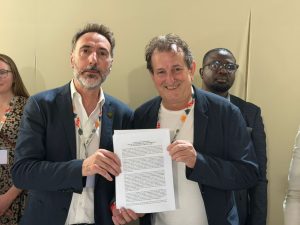Parliamentarians from 92 Countries Avoid Responding to Survey on Climate Goals
*Translated from the original Portugese by GLOBE. Published in FOLHA DE S.PAULO
August 29, 2025
COP30 Director laments lack of engagement; organization launches guide in Portuguese to encourage legislators’ participation
—Gabriel Gama, Rio de Janeiro
Parliamentarians from 92 countries avoided responding to a survey on their engagement in implementing the new NDCs (Nationally Determined Contributions), as the targets for reducing greenhouse gas emissions under the Paris Agreement are called. Of 114 legislative bodies contacted across all continents, only 22 responded.
“There’s truly a lack of awareness about this process. Most members of Parliament are focused on what’s happening domestically and rarely consider international issues,” says Malini Mehra, CEO of Globe Legislators, a nonprofit organization that conducted the survey from January to July 2025.
The results were presented on Wednesday, 27 August 2025, at the Pre-COP30 Parliamentary Forum held during Rio Climate Action Week at the Rio de Janeiro City Council.

Ana Toni, executive director of COP30, the United Nations climate change conference, laments the lack of engagement. “It’s very bad, because combating climate change is a state policy, not a government one. The participation of parliamentarians is essential,” she says.
Mehra assesses that a large portion of congressmen are unaware of COP30. “Most parliaments, including Brazil’s, lack structured engagement in the NDC development process. It’s a key weakness that urgently needs to be addressed,” she states. Globe Legislators is the focal point for parliamentarians at the UNFCCC, the UN convention on climate change, and has been researching the actions of the Legislative Branch since 1991. Former US Vice President Al Gore is one of the organization’s founders.
The survey was sent to staff and members of Parliament. Responses came from various committees, including those on the environment, climate, finance, agriculture, and health. The survey also involved interviews with members of legislative houses and research on official websites.
Four in ten respondents state that their countries’ parliaments were not involved in developing the commitments. Ana Toni states that some members of Congress were involved in the process of updating Brazil’s climate target.
“We invest a huge amount of effort supporting civil society organizations, which is absolutely correct, but we forget the fundamental role of parliamentarians, because they are the constitutional actors who hold governments accountable,” says Mehra. The study assesses that parliamentary powers of scrutiny, oversight, and budget approval can favor targets that are more likely to achieve the objectives. “No country can effectively implement its national climate change commitments without the approval of members of parliament,” the document states.
To date, only 29 of the 197 countries have submitted new NDCs, and the COP30 presidency is considering the possibility that only 100 nations will formalize the commitments before the Belém conference in November. The deadline to submit the updated targets expired in February and has been extended until September.
“If we don’t engage parliamentarians in climate processes, they will be absent, and action will not happen,” Mehra analyzes. “They should tell the government, ‘You have a deadline until February, and we will hold you accountable every month to report to us what you are doing to meet it.’ Legislators can exercise this discipline over the executive branch’s responses,” says the organization’s CEO.
The study identified nations with more structured engagement around NDCs, such as Sweden. The country actively involved Parliament in developing its emissions targets, according to the research. The Swedish government must present a climate action plan every four years, which facilitates parliamentary oversight on the issue.
For Mehra, the United Kingdom is the best example of legislator involvement in developing commitments. She states that the government engaged regularly with the House of Commons during the preparation for COP26 in 2021.
“This helped build greater understanding and engagement among parliamentarians in the UNFCCC processes,” says the CEO.
The research found that Tuvalu, an island nation in the Pacific at risk of disappearing due to sea level rise, established parliamentary committees to review its climate target. In Ethiopia, the government made consultative presentations to legislators on the design of NDCs.
Other countries, such as Canada and Thailand, did not include parliamentarians in the process. Portuguese Guide and More Space at the UN
Globe Legislators launched this Wednesday the Parliamentarians’ Guide to Climate Change, the first Portuguese translation of a document developed by the University of Exeter in the United Kingdom.
More Like This:
Berlin Roundtable Underscores Parliamentary Role in NDCs
COP side event in Rio discusses the role of Parliaments
GLOBE Pre-COP Parliamentary Forum, 27 August 2025, Rio Legislative Chamber




